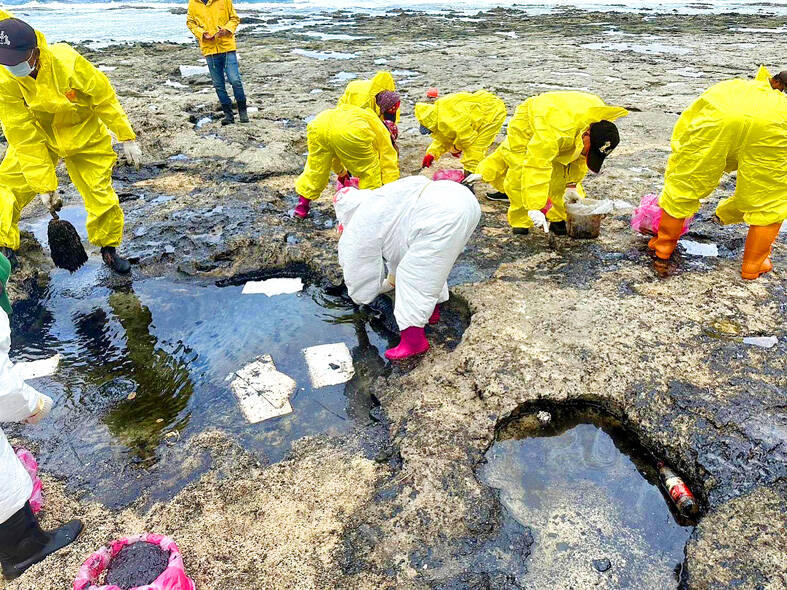Waste oil found along the east coast since early this month could be runoff from the washing of oil tanker cabins, the Ocean Affairs Council said on Saturday.
No oil tankers that have recently passed eastern Taiwan have been found to have leaked waste oil, based on information gleaned from satellite images and drones, leaving the source of the oil unknown, the council’s Ocean Conservation Administration said in a statement.
The statement was released following an investigation conducted by local officials after several instances of waste oil were reported since the beginning of the month, mostly on coastal rock formations in Taitung City, Hualien County, Yilan County, Keelung and Pingtung County.

Photo courtesy of the Ocean Affairs Council
The first polluted coastal area, about 50 meters in length, was found on Green Island (綠島) off Taitung County on Dec. 1.
Other examples include a 150m by 40m area in Taitung’s Jialulan Recreation Area (伽路蘭遊憩區) and a 400m by 40m area in Yilan County’s Toucheng Township (頭城).
As of Saturday, local governments had dispatched 70 vehicles and 409 people to clean 16 areas, with 2.705 tonnes of waste — including oil-absorbent sheets, pebbles and sand — removed, the administration said.
To determine the source of the waste oil, officials from local environmental protection bureaus collected samples and used simulation and tracking technologies, but no sources were found, the administration said.
An analysis found that oil samples collected on Green Island were a mixture of light and heavy crude oil, the administration said, adding that the substance could be from runoff from the washing of oil tanker cabins.
Waste oil samples collected in Keelung and New Taipei City have been harder to analyze, because the light crude oil had volatilized and the remnants are coagulated, the administration said, adding that it is likely the same as that found on Green Island.
Also, two kinds of waste oil were collected in Pingtung County’s Jiupeng Desert (九棚大沙漠) — a sandy beach — but they were probably different from what was found on Green Island and in Keelung, it said.
The administration called on ship crew members to keep waste oil on their vessels and to hand it to certificated companies to dispose of when arriving at the next harbor.
Any vessel caught disposing of waste oil in the ocean faces a fine of up to NT$30 million (US$958,038) for breaching the Marine Pollution Prevention Act (海洋污染防治法), the administration said.

An essay competition jointly organized by a local writing society and a publisher affiliated with the Chinese Communist Party (CCP) might have contravened the Act Governing Relations Between the People of the Taiwan Area and the Mainland Area (臺灣地區與大陸地區人民關係條例), the Mainland Affairs Council (MAC) said on Thursday. “In this case, the partner organization is clearly an agency under the CCP’s Fujian Provincial Committee,” MAC Deputy Minister and spokesperson Liang Wen-chieh (梁文傑) said at a news briefing in Taipei. “It also involves bringing Taiwanese students to China with all-expenses-paid arrangements to attend award ceremonies and camps,” Liang said. Those two “characteristics” are typically sufficient

A magnitude 5.9 earthquake that struck about 33km off the coast of Hualien City was the "main shock" in a series of quakes in the area, with aftershocks expected over the next three days, the Central Weather Administration (CWA) said yesterday. Prior to the magnitude 5.9 quake shaking most of Taiwan at 6:53pm yesterday, six other earthquakes stronger than a magnitude of 4, starting with a magnitude 5.5 quake at 6:09pm, occurred in the area. CWA Seismological Center Director Wu Chien-fu (吳健富) confirmed that the quakes were all part of the same series and that the magnitude 5.5 temblor was

The brilliant blue waters, thick foliage and bucolic atmosphere on this seemingly idyllic archipelago deep in the Pacific Ocean belie the key role it now plays in a titanic geopolitical struggle. Palau is again on the front line as China, and the US and its allies prepare their forces in an intensifying contest for control over the Asia-Pacific region. The democratic nation of just 17,000 people hosts US-controlled airstrips and soon-to-be-completed radar installations that the US military describes as “critical” to monitoring vast swathes of water and airspace. It is also a key piece of the second island chain, a string of

The Central Weather Administration has issued a heat alert for southeastern Taiwan, warning of temperatures as high as 36°C today, while alerting some coastal areas of strong winds later in the day. Kaohsiung’s Neimen District (內門) and Pingtung County’s Neipu Township (內埔) are under an orange heat alert, which warns of temperatures as high as 36°C for three consecutive days, the CWA said, citing southwest winds. The heat would also extend to Tainan’s Nansi (楠西) and Yujing (玉井) districts, as well as Pingtung’s Gaoshu (高樹), Yanpu (鹽埔) and Majia (瑪家) townships, it said, forecasting highs of up to 36°C in those areas